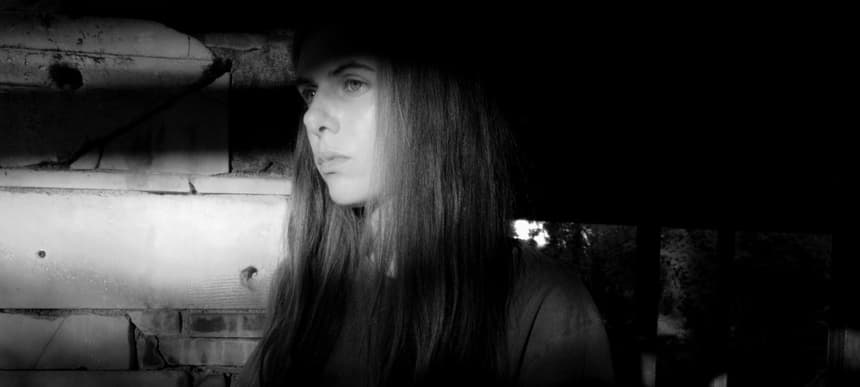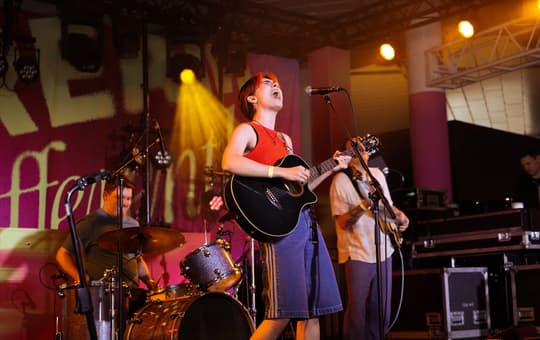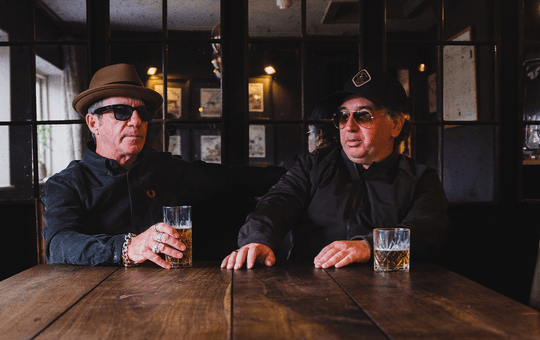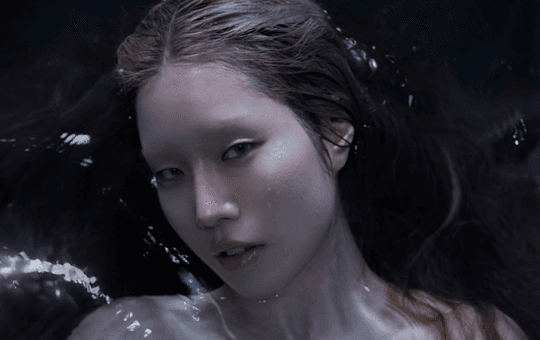
Laurel Halo interview: "Looking beyond."
“My dad gave me that piece several years ago, sort of off-handed,” says Laurel Halo of the stark yet satirical artwork that graces the cover of her new album ‘Chance of Rain’, the follow-up to last year’s critically acclaimed ‘Quarantine’ and her second long player on London label Hyperdub. The cover features a detail of the drawing by her artist father while the back features the rest, she explains over Skype from Berlin, her voice thick with a cold that set in following her recent tour in Australia and New Zealand. “He said, 'I have this extra drawing lying around and I don’t have a space to hang it in my house. Do you want it?' and just gave it me. It’s been on the wall behind my monitors for a few years now. I’m just really glad that I was finally able to use it in a certain context. Because I wouldn’t just use it for the sake of it. It would have to fit in with the music.”
Where ‘Quarantine’ had an air-born – and airborne, for that matter – quality, ‘Chance of Rain’ goes deep underground, but not in the sense it beats with a basement club heart (though it would be entirely at home in the womb/tomb-like space of Plastic People). Rather there is the scent of recently turned soil to the album; it resonates with the clods of earth that decorate its cover. It is both damp and musty, rich and fertile. Halo drills through layers and exposes contrasts at every turn. Muffled and sharp sounds jostle shoulders, diametrically opposed textures rise and fall, tempos race and collapse into one another. Still/Dromos, which feels like the core of the album, conjures up the vortex that those familiar with her live sets would recognise: those beckoning keyboard melodies acting as an invitation to leap into the abyss. There are bluesy moments – bookend tracks Dr. Echt and -Out, and central interlude Melt – and then there’s Thrax, which sounds like the seas of grime and techno meeting, an irritant wobble and metallic tang the evidence of fruitful exchange between the two realms. There is so much going on in the fabric of ‘Chance of Rain’ yet it plays out in the ears and the imagination like the taste of a dream on first waking. It’s her most mature, fluid and fluent work to date.
“It’s difficult to talk about,” says Halo of the record more than once during our interview. Instead we talk about her father and the drawing that in part inspired the music. She mentions a sense of seeing something beyond what is apparent in his artworks. It’s a quality that Halo has long established in her own work: a playful presentation of ideas and emotions, a sense that all is at once as it seems and nothing like it seems. Switching topics, she laughs when she says that a friend had said the bespectacled central figure in the drawing resembled 19th century Austrian composer Gustav Mahler, an observation later confirmed by her father when she asks him for some background on the drawing for this piece.
“Your question about the drawing puts me in the position of having to remember what it was like to be seventeen, which was my age in 1969 when I drew it,” Halo’s father, Arthur Chartow, told her over email. “Somebody thought the man in black was Mahler, they were very astute. However it was drawn from imagination, not copied from any existing photo of the composer. Why he's there I couldn't say, except that I wanted a figure with sufficient severity or gravitas. Perhaps I was listening to the Symphony No. 2, 'The Resurrection' which appears to be the theme of the drawing. The dead are rising, or being lifted, from their graves, and all appear to be depressed or hungover, maybe disappointed or just grumpy. They seem to be unaware of the beautiful landscape which they inhabit. Stylistically, this drawing was heavily influenced by Durer and Brueghel the Elder. Another big influence when I was that age was Franz Kafka.”
We talk for an hour or so, touching on club melancholia, the evolution of her creative process and the contrasting meanings of moods and emotion.
I wanted to start with the artwork for 'Chance of Rain', which features one of your father’s drawings. I was looking through the gallery on his website. There’s a surreal romance to his work, this loving portrayal of buildings and industrial landscapes that are often neglected and ignored. The majority of the work that’s up there is very different to the work you chose for the cover, which I believe is one of his earlier drawings, and I was wondering when you first became aware of your dad as an artist and became interested in what he did?
Laurel Halo: “I’ve been interested in his work since I was young. When I was a kid I liked more of his psychedelic work, but I always found his landscapes to be beautiful. When I got older I got a better sense of the quality of light and proportion and scale in his pieces and I think they’re really special. He doesn’t push his work at all but recently his works have been starting to sell more in some galleries so that’s exciting.”
“I think what’s inspiring about his work is that he always imbues something that’s apparent with what’s beyond." Laurel Halo on her father's art
Side by side in the gallery are real landscapes and imaginary landscapes, some from dreams. Internal and external realities are valued equally, which to me resonates with your music.
Laurel Halo: “I think what’s inspiring about his work is that he always imbues something that’s apparent with what’s beyond. I wouldn’t necessarily say it’s romantic, but it’s definitely looking beyond what you’re actually looking at. That’s something that’s always been inspiring to me.”
I can hear that on this album.
Laurel Halo: “Some of his works are pretty dark and satirical, which resonates with me too. Especially this artwork used for the album cover. There’s just something funny about it, in the sense that my dad grew up in New York City and it looks like these guys are commuters that he saw on a daily basis growing up, they look just as pissed off waking up into the afterlife as they do waking up every day going to work. There’s this lack of appreciation for the cosmic because they’re so focused on themselves and this myopic vision of everyday life. And while it’s kind of taking the piss, at the same time there’s something hopeful about it. Obviously in the sense that these men are waking up into the afterlife – the generous idea that there is an afterlife – but also for the suggestion that there is an inherent harmony to everything, the way objects and people and nature are so gracefully related to each other in this drawing.”
"There’s just something funny about the drawing, in the sense that my dad grew up in New York City and it looks like these guys are commuters that he saw on a daily basis growing up, they look just as pissed off waking up into the afterlife as they do waking up every day going to work." Laurel Halo

'Chance of Rain' artwork, front cover
One of the things I love about the album is this dynamic between the still moments and the in-motion moments. Hearing you talk about the drawing it’s starting to really make sense: I’m thinking about these commuters’ mindsets and them being in motion and not being able to appreciate what’s around them.
Laurel Halo: “I think with the image too, there’s this question, of what is the role of movement? The drawing itself has such a sense of movement: the curve of the hills, the plateaus in the background, the clouds in the sky, the choreography of these men rising of these graves in turn. There’s just something potent about that and it fills you with this phenomenological sense of wonder [laughs].”
With Still/Dromos I was wondering if you were referencing stillness as a way through, as a transformative moment. If you meant ‘dromos’ as a passage…
Laurel Halo: “I think with that track I wanted to do this A/B of a really chaotic sound and then empty out the track. You can just feel so much more of a sense of movement and forward progression in the absence of all this chaotic sound texture.”
It’s one of your most confident tracks. The ease with which you switch from the motion to the stillness and the energy that comes from that, I really felt it in the chest. It’s held there, and that’s really powerful.
Laurel Halo: “I’m glad it resonated with you.”
We were talking earlier, before we started the interview, about the creative cycle and these periods of racing and rushing to the completion of something, and then the stillness after and the uncomfortableness of that. In terms of creative process, is that something you were thinking about at all?
Laurel Halo: “I’m not sure how much racing played itself into this record, so much as the power of rhythm, and how rhythm can make time behave in weird ways. When you’re feeling a rhythm and you’re in a moment, everything else dissolves. I guess I’m really drawn to making rhythmic music because in that moment time dissolves and you’re part of the rhythm and you’re just at one with this music. I wanted to try making some textural, rhythmic music that was anchored by a peaceful center. I’m not sure how successful that was [laughs].”
There is this late night blues bar feel to it too, with both the opening and closing tracks. I’m imagining you sitting at the piano after closing time with your hair swept up under a workman’s cap doing this little piano turn to yourself – and the kind of joy and sadness of solitude.
Laurel Halo: “Maybe it’s club melancholia.”
End of the night blues.
Laurel Halo: “It’s the end of the night blues and you’re going home alone.”
"Club music dictates a communal experience but even when you’re in a club you can still feel very much on your own and lost in music.” Laurel Halo
There’s a beauty in that too. You know when you quite like feeling sad?
Laurel Halo: “I love being alone, but that’s just me.”
Learning to enjoy being alone was one of the most important lessons I’ve ever learnt. There were years and years when I couldn’t be by myself.
Laurel Halo: “Maybe there’s a duality there: club music dictates a communal experience but even when you’re in a club you can still feel very much on your own and lost in music.”
Totally. I love Melt as well, which feels texturally like the listener is traveling with you through a land.
Laurel Halo: “It sounds like a bunch of MP3s were dumped into a vat of acid and they’re all screaming in pain [laughs].”
I can see you in Roger Rabbit as the villain dipping the cartoons in the acid.
Laurel Halo: “Exactly.”
That one really feels evocative of your father’s drawing.
Laurel Halo: “There’s definitely a transformative aspect to that track in particular.”
Thrax feels like the one that’s most in conversation with ‘Quarantine’.
Laurel Halo: “Interesting. I would never have thought that.”
There’s this irritant quality that resonates with ‘Quarantine’, but then there’s this sweet resolve. We’ve spoken before about your feelings towards making this record and how it related to previous work, or didn’t relate to previous work. I was wondering what your feelings were about that now?
Laurel Halo: “I think this record is an evolution of my sound. ‘Behind The Green Door’ and ‘Chance of Rain’ are much more in line with what I do live because they are recordings and expansions of live tracks. So there is a disjoint between ‘Quarantine’ and ‘Chance of Rain’ in the sense that ‘Quarantine’ is entirely a studio record and then I had to retro-engineer those tracks to figure out how to play live, so I said to myself going forward you’re going to make music for live first because that’s what music is about. It’s about being performed live. That’s just where I’m coming from. Obviously you can make music however you want to. At the same time you can very clearly hear links between those two records even though they have different sounds. ‘Quarantine’ being an ambient/vocal-driven record and ‘Chance Of Rain’ being this ambient/abstract techno record I guess, for lack of a better description. But in addition I think there are themes of aggression and resolution present on both, and maybe these are expanded on more with ‘Chance Of Rain’.”

'Chance of Rain' back cover
I see the piano as your voice on this record. It feels like you are singing through it.
Laurel Halo: “That’s interesting. I would say that the piano, or the keyboard parts, those imbue the most sense of humanity or sense of warmth on the record, because the rest of it is quite synthetic.”
The bookend tracks are such little portraits. I see them almost like cameos.
Laurel Halo: “Yeah, like busted versions of Elgar’s ‘Enigma Variations’, little portraits for mystery friends of mine [laughs].”
I was reading the artist statement on your dad’s website – and he talks about painting and humanity’s need for art: “It was the idea that a painting could take me away someplace different.” Is that why you pursue music?
Laurel Halo: “It’s a really fantastic reason to make music, but it’s not the only reason.”
There was much in his artist’s statement that made me think of you.
Laurel Halo: “Two generations of space cadets.”
"I think I’m pretty allergic to the word ‘romantic’. But there is something felt on this record. It is a moody record.” Laurel Halo
I know you say that romance isn’t a word you use or are drawn to, but it’s something I do feel in your work. Not in a Barbara Cartland novel kind of way obviously, but in this deep appreciation and love of sound.
Laurel Halo: “I think that there’s a romance with sound and music itself but I think I’m pretty allergic to the word ‘romantic’. But there is something felt on this record. It is a moody record.”
Romanticism’s opposite would be a stark reality, which is not a place in which your music operates either. Hearing beyond what is heard makes sense. There’s an acceptance and recognition of reality but a belief in something beyond.
Laurel Halo: “It’s about an awareness of the present to rocket launch you into outer space [laughs]. Although having seen Gravity recently makes me question whether space is so great. I do think a lot about what’s the potentiality of the unheard.”
Yeah, in the very act of listening, it’s not just the sounds that you hear. There’s more that you bring to it – your experience, the context in which you are listening, or what you know about something in relation to the music.
Laurel Halo: “Sometimes I wish my music was more literal.”
"I do think a lot about the potentiality of the unheard.” Laurel Halo
What do you mean? Do you mean vocally literal?
Laurel Halo: “Not to do with vocals, but just to do with the sound. There’s a lot of in-between elements to my sound and I sometimes wonder if I were to actually have the hidden parts just be hidden, or removed completely, instead of having these parts be slightly revealed, what kind of difference that would make.”
It would be interesting to explore but I think so much of the power of your music comes from that understanding that life is layers and things are never as literal as we want them to be. That’s the range of emotions I get from listening to your music. The way it can veer in a split second from something almost devastated to something quite joyful.
Laurel Halo: “It’s fun for me to try and combine these opposing forces in my music.”
It’s the most texturally fluent you’ve got so far. It is also hard to talk about because it’s tapping into a lot of stuff that’s felt on a visceral level.
Laurel Halo: “I think at the end of the day it’s a much simpler record than ‘Quarantine’, because with that there was this whole complicated relationship between the vocals and the ambient background. Whereas this record is just kind of a moody dance record. I think that there’s a greater premium on mood on this record than on past releases. I wanted the mood to be way more subtle and not necessarily just joyful or dejected or tripped out or fun or sexy or whatever. I wanted to have these un-pinpointable moods on the record.”
Is that a headspace you spend much time in?
Laurel Halo: “I guess when it comes to music listening for me, it’s a really quick turn-off if I hear a piece of music and I can identify what it’s about and there’s no soul behind it. Maybe it’s too idealistic but I do think that it is possible to have a unique mood or sense of feel on a record, that makes your music stand apart from what’s already been out there.”
"It’s important also to stress the difference between mood and emotion: mood as source of tone colour, rather than emotion as source of creativity." Laurel Halo
Absolutely. What is articulated on this album is something unique, but it’s also something very universal. This kind of contemporary mulch of emotions.
Laurel Halo: “I think it’s important also to stress the difference between mood and emotion: mood as source of tone colour, rather than emotion as source of creativity. I’m not trying to insert a personality or necessarily even human emotion into this record. I’m trying to have it be more this universal mood demonstration, but of course my arbitrary distinctions between mood and emotion might fall flat when a listener like you simply enjoys the music from your own perspective. There’s this duality too between what I want to express with the music and what’s actually heard by others.”
Has your dad heard the record?
Laurel Halo: “No, I haven’t sent it to him. He’s busy with his own life.”
Has he heard previous works?
Laurel Halo: “He has, yes.”
"There’s this duality between what I want to express with the music and what’s actually heard by others.” Laurel Halo
What does he think of your music?
Laurel Halo: “I don’t know whether he likes it or not but he is supportive. He always says I’m proud of you.”
Do you think being around an artist or having an artist in your close family made you more predisposed to that as a life?
Laurel Halo: “Not necessarily, no. Because my dad always worked full-time. Even though art was his number one, he’s always had a job to support himself. I didn’t grow up in a major cultural centre so I didn’t have any examples of practical working artist friends or colleagues. Even when I was younger, the whole concept of living off of art was totally foreign. My parents always said, you have to support yourself but when you can support yourself you can do what you like.”
That’s good advice. I like that mixture of reality and romance: you can follow your dreams as long as you can support yourself.
Laurel Halo: “They saw music as a hobby. It was definitely harder when I was younger, because they were like, why are you doing this? But it does feel good to prove them wrong.”
Hyperdub will release Laurel Halo's new album 'Chance of Rain' on 28th October 2013.














